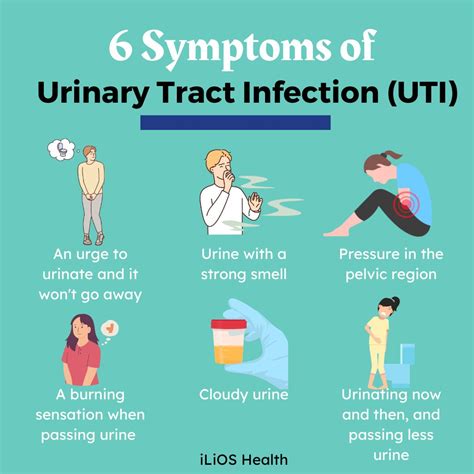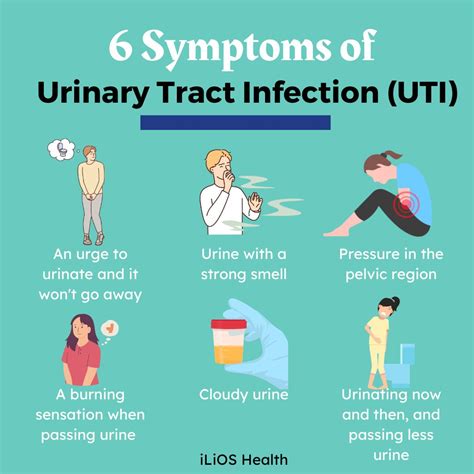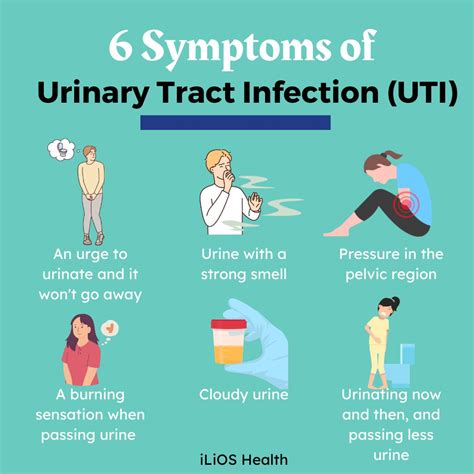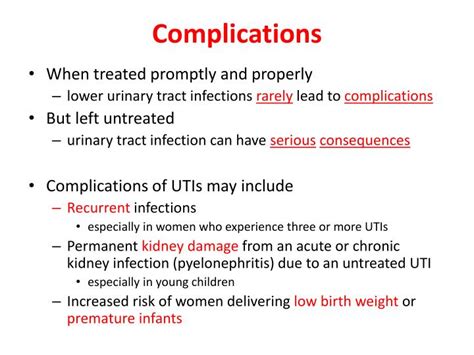Intro
Discover 5 surprising UTI facts men should know, including prevention methods, symptoms, and treatment options, to help manage urinary tract infections and promote urological health and wellness.
Urinary tract infections, commonly referred to as UTIs, are a prevalent health issue that affects millions of people worldwide, with a significant portion being women. However, men can also experience UTIs, and it's essential to understand the specifics of this condition to provide accurate information and support. In this article, we will delve into the world of UTIs in men, exploring their causes, symptoms, diagnosis, treatment, and prevention.
The importance of discussing UTIs in men cannot be overstated. While they are less common in men than in women, UTIs can still cause significant discomfort, pain, and disruption to daily life. Furthermore, if left untreated, UTIs can lead to more severe complications, such as kidney damage or sepsis. It's crucial for men to recognize the signs and symptoms of UTIs and seek medical attention promptly if they suspect they have an infection.
UTIs are a type of infection that occurs when bacteria, or less commonly, fungi or viruses, enter the urinary tract. The urinary tract includes the kidneys, ureters, bladder, and urethra. In men, the urethra is longer than in women, which can make it more difficult for bacteria to reach the bladder and cause an infection. However, when an infection does occur, it can be just as uncomfortable and potentially serious as in women. Understanding the causes, recognizing the symptoms, and knowing how to prevent UTIs are vital for men's health and wellbeing.
Causes and Risk Factors of UTIs in Men

UTIs in men are often caused by bacteria, with Escherichia coli (E. coli) being the most common culprit. These bacteria can enter the urinary tract through the urethra, typically from the rectal area. Several factors can increase a man's risk of developing a UTI, including age, with the risk increasing as men get older. Other risk factors include having an enlarged prostate, which can obstruct the flow of urine and create an environment conducive to bacterial growth. Men with diabetes are also at a higher risk due to their bodies' reduced ability to fight off infections. Additionally, men who use catheters or have a history of urinary tract infections are more susceptible to UTIs.
Understanding Bacterial Causes
The bacteria that cause UTIs can come from various sources, including the skin, rectum, or from sexual partners. In some cases, the bacteria may already be present in the urinary tract without causing symptoms, a condition known as asymptomatic bacteriuria. However, when these bacteria multiply and cause an infection, it's essential to treat them promptly to avoid complications.Symptoms of UTIs in Men

The symptoms of UTIs in men can vary depending on the location of the infection within the urinary tract. Common symptoms include a burning sensation while urinating, frequent urination, and cloudy or strong-smelling urine. Men may also experience pain in the lower abdomen, back, or groin area. In more severe cases, UTIs can cause fever, chills, and nausea. It's crucial for men to recognize these symptoms and seek medical attention if they experience any of them, as early treatment can prevent the infection from spreading to the kidneys.
Recognizing Severe Symptoms
Severe symptoms of UTIs can include intense pain, vomiting, and signs of sepsis, such as a high fever, rapid heartbeat, and confusion. If men experience any of these severe symptoms, they should seek emergency medical care. Prompt treatment is essential to prevent long-term damage and ensure recovery.Diagnosis of UTIs in Men

Diagnosing UTIs in men typically involves a combination of physical examination, medical history, and laboratory tests. A healthcare provider may perform a urinalysis to check for the presence of bacteria, blood, or other signs of infection in the urine. In some cases, a urine culture may be ordered to identify the specific type of bacteria causing the infection. This information is crucial for selecting the most effective antibiotic treatment.
Importance of Accurate Diagnosis
Accurate diagnosis is vital for effective treatment and to prevent the misuse of antibiotics. Overuse or misuse of antibiotics can lead to antibiotic resistance, making infections harder to treat. By identifying the specific cause of the UTI, healthcare providers can prescribe targeted treatments, reducing the risk of complications and promoting recovery.Treatment of UTIs in Men

Treatment for UTIs in men usually involves antibiotics to kill the bacteria causing the infection. The type and duration of antibiotic treatment depend on the severity of the infection and the type of bacteria identified. In addition to antibiotics, men can help manage their symptoms by drinking plenty of water to help flush out bacteria, using a heating pad to alleviate discomfort, and avoiding spicy or irritating foods.
Role of Self-Care in Recovery
Self-care plays a significant role in recovering from a UTI. Men should prioritize rest, maintain good hygiene, and avoid sexual activity until the infection has been fully treated. By combining medical treatment with self-care practices, men can help ensure a speedy recovery and reduce the risk of future infections.Prevention of UTIs in Men

Preventing UTIs in men involves several lifestyle adjustments and habits. Drinking plenty of water helps to dilute urine and increase urination frequency, making it harder for bacteria to multiply. Practicing good hygiene, especially after sexual activity and bowel movements, can reduce the introduction of bacteria into the urinary tract. Additionally, avoiding the use of spermicides and certain types of condoms, which can increase the risk of UTIs, may also be beneficial.
Lifestyle Changes for UTI Prevention
Making certain lifestyle changes can significantly reduce the risk of developing UTIs. This includes urinating when the need arises, rather than delaying, to prevent bacteria from multiplying. Wearing loose-fitting clothing and cotton underwear can also help keep the genital area dry and reduce bacterial growth. By incorporating these habits into daily life, men can lower their risk of UTIs and maintain better urinary health.Complications of Untreated UTIs in Men

Untreated UTIs can lead to serious complications, including the spread of the infection to the kidneys, a condition known as pyelonephritis. This can cause permanent kidney damage if not treated promptly. Other potential complications include the development of sepsis, a life-threatening condition that arises when the body's response to an infection damages its own tissues and organs. Prostate issues, such as prostatitis, can also arise from untreated UTIs, leading to chronic pain and other symptoms.
Importance of Prompt Medical Attention
Given the potential for serious complications, it's crucial for men to seek prompt medical attention if they suspect they have a UTI. Early diagnosis and treatment can prevent the spread of the infection and reduce the risk of long-term damage. By understanding the potential complications and taking proactive steps towards health, men can protect themselves against the more severe outcomes of untreated UTIs.As we conclude our exploration of UTIs in men, it's clear that understanding this condition is crucial for maintaining good health and preventing complications. By recognizing the causes, symptoms, and treatment options, men can take proactive steps towards preventing UTIs and ensuring they receive the care they need if an infection occurs. We invite you to share your thoughts and experiences with UTIs, and to consider the importance of discussing men's health openly to promote awareness and support.
What are the most common symptoms of UTIs in men?
+The most common symptoms include a burning sensation while urinating, frequent urination, and cloudy or strong-smelling urine. Men may also experience pain in the lower abdomen, back, or groin area.
How are UTIs in men typically diagnosed?
+Diagnosis typically involves a physical examination, medical history, and laboratory tests such as urinalysis and urine culture to identify the presence and type of bacteria.
Can UTIs in men be prevented?
+Yes, UTIs can be prevented by practicing good hygiene, drinking plenty of water, urinating when needed, and avoiding certain products that may irritate the urethra.
